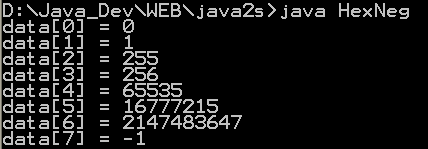Pass an integer by reference : int « Data Type « Java
- Java
- Data Type
- int
Pass an integer by reference
public class Main {
public static void main(String[] argv) {
int[] a = new int[1];
a[0] = 1;
add(a);
System.out.println(a[0]);
}
static void add(int[] a) {
a[0] = a[0] + 2;
}
}
// 3
Related examples in the same category
| 1. | Java int:int is 32 bit signed type ranges from –2,147,483,648 to 2,147,483,647. | | |
| 2. | Integer class creates primitives that wrap themselves around data items of the int data type | | |
| 3. | Rolling the Dice | | |
| 4. | Are all hex integers negative | |  |
| 5. | Int Overflow | |  |
| 6. | Multiply a decimal fraction, not using floating point | |  |
| 7. | The Integer class cannot be changed | | |
| 8. | Demonstrate a type wrapper. | | |
| 9. | Autoboxing/unboxing int | | |
| 10. | Getting a Valid Integer | | |
| 11. | Convert string to integer | | |
| 12. | Integer.toBinaryString | | |
| 13. | Convert octal number to decimal number | | |
| 14. | Convert binary number to decimal number | | |
| 15. | Convert decimal integer to octal number | | |
| 16. | Convert decimal integer to hexadecimal number | | |
| 17. | Convert hexadecimal number to decimal number | | |
| 18. | Integer.toHexString | | |
| 19. | Integer.MIN_VALUE | | |
| 20. | Java Sort int Array | | |
| 21. | Compare Two Java int Arrays | | |
| 22. | Modifiable Integer | | |
| 23. | Given an integer, return a string that is in an approximate, but human readable format | | |
| 24. | Returns the sign for int value x | | |
| 25. | Gets the maximum of three int values. | | |
| 26. | Gets the minimum of three int values. | | |
| 27. | Add two integers, checking for overflow. | | |